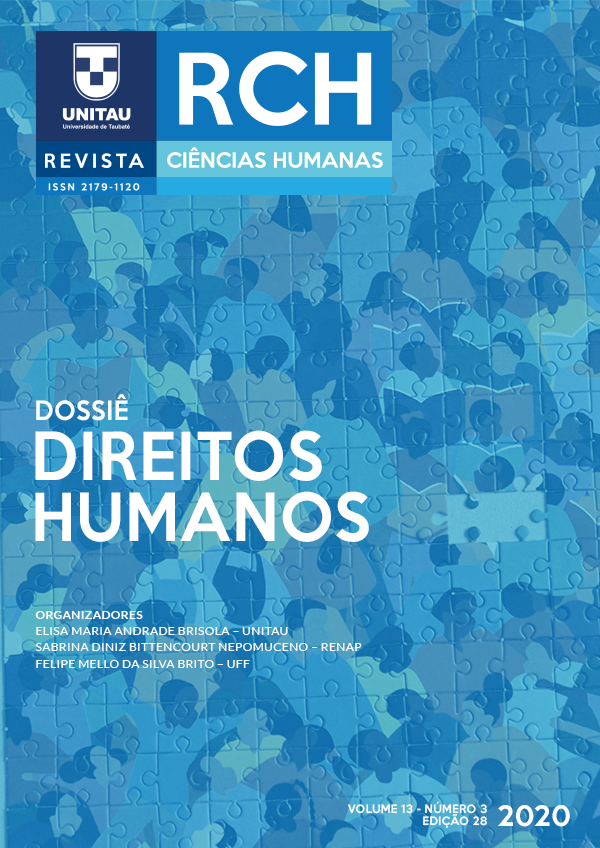NA PISTA DE FRANTZ FANON
notas sobre alienação e racismo
DOI:
https://doi.org/10.32813/2179-1120.2020.v13.n3.a654Palavras-chave:
Frantz Fanon (1925-1961), Marco teórico pós-colonial, Racismo, SaúdeResumo
O presente escrito trata do conceito de “alienação” na obra de Frantz Fanon (1925-1961). O objetivo é analisar de que modo esse conceito é apresentado pelo autor e que possíveis armadilhas e pistas analíticas legam para o estudo do racismo. De modo geral, Frantz Fanon parece apontar os limites de abordagens essencialistas e restritas ao plano subjetivo e oferecer um marco analítico permanentemente crítico e orientado para o caráter contextual, diverso e contingente do racismo. De modo a valorizar a atualidade das críticas de Fanon, aproveito seu arcabouço teórico-conceitual e político para examinar as sutilezas em torno das relações entre saúde e raça.
Métricas
Referências
ABU EL-HAJ, Nadia. “The Genetic Reinscription of Race”. Annual Review of Anthropology, n. 36, 2007, p. 282- 300.
ANZALDÚA, Gloria. Falando em línguas: uma carta para as mulheres escritoras do terceiro mundo. Revista Estudos Feministas, Florianópolis, v. 8, n. 1, p. 229-236, 2000.
BRASIL. Ministério da Saúde. Secretaria de Políticas de Saúde. Manual de doenças mais importantes, por razões étnicas, na população brasileira afro-descendente. Brasília: Ministério da Saúde, 2001, 78 p. Disponível em: <http://bvsms.saude.gov.br/bvs/publicacoes/doencas_etnicas.pdf>. Acesso em: 09 jan 2020.
CALVO-GONZALEZ, Elena. ‘Neutrófilo baixo quer dizer pé na cozinha?’: o papel de cientistas e não-cientistas nos discursos sobre leucopenia e diferença “racial” no Brasil contemporâneo. In: REUNIÃO ANUAL DA ASSOCIAÇÃO NACIONAL DE PÓS-GRADUAÇÃO E PESQUISA EM CIÊNCIAS SOCIAIS, 2009, 33. Caxambu, MG, Brasil, 2009.
DU BOIS, William E. B. “Do nosso labor espiritual”. In: SANCHES, Manuela Ribeiro (Ed.). Malhas que os impérios tecem: textos anticoloniais, contextos pós-coloniais. Edições 70, 2011, p. 49-57.
FANON, Frantz. Pele negra, máscaras brancas. Tradução de Renato da Silveira. Salvador: EDUFBA, 2008, 194 p.
______. “Antilhanos e Africanos”. In: ______. Em defesa da revolução africana. Tradução de Isabel Pascoal. Sá da Costa Editora: Lisboa, 1980, p. 7-31.
______. “Racismo e cultura”. In: ______. Em defesa da revolução africana. Tradução de Isabel Pascoal. Sá da Costa Editora: Lisboa, 1980, p. 34-48.
______. Os condenados da terra. Rio de Janeiro: Editora Civilização Brasileira, 1968.
FAUSTINO, Deivison M. “Por que Fanon? Por que agora?”: Frantz Fanon e os fanonismos no Brasil. Tese (Doutorado) - Universidade Federal de São Carlos. São Carlos: UFSCar, 2015, 260 p.
GONZALEZ, Luiz Ricardo et al. Neutropenia étnica na prática da Medicina do Trabalho: Revisão. Revista Brasileira de Medicina do Trabalho. São Paulo, v. 8, n. 1, 2010.
HEMORIO. Instituto Estadual de Hematologia Arthur de Siqueira Cavalcanti. Manual do paciente - Leucopenia [Orientações Básicas aos Pacientes e Familiares]. Rio de Janeiro (RJ), 2014. Disponível em: <http://www.hemorio.rj.gov.br/html/pdf/Manuais/Leucopenia.pdf>. Acesso em: 15 jan 2020.
LAGUARDIA, Josué. Raças e doenças: uma relação delicada. Physis, Rio de Janeiro, v. 12, n. 2, p. 417-422, 2002.
______. Raça, genética & hipertensão: nova genética ou velha eugenia? História, Ciências, Saúde – Manguinhos, v. 12, n. 2, p. 371-93, 2005.
MBEMBE, Achille. As formas africanas de auto-inscrição. Estudos Afro-asiáticos, v. 23, n. 1, p. 171-209, 2001.
SAID, Edward W. Cultura e imperialismo. São Paulo: Companhia das Letras, 2011.
SENGHOR, Léopold. “O contributo do homem negro”. In: SANCHES, Manuela Ribeiro (Ed.). Malhas que os impérios tecem: textos anticoloniais, contextos pós-coloniais. Edições 70, 2011, p. 73-92.
Downloads
Publicado
Como Citar
Edição
Seção
Licença
Copyright (c) 2020 Revista Ciências Humanas

Este trabalho está licenciado sob uma licença Creative Commons Attribution 4.0 International License.
As publicações da Revista Ciências Humanas estão registradas sob a licença Creative Commons Attribution CC-BY.
1. Os conteúdos dos trabalhos são de exclusiva responsabilidade de seu autor.
2. É permitida a reprodução total ou parcial dos trabalhos publicados na Revista, desde que citada a fonte.
3. Ao submeterem seus trabalhos à Revista os autores certificam que os mesmos são de autoria própria e inéditos (não publicados em qualquer meio digital ou impresso).
4. Os direitos autorais dos artigos publicados na Revista são do autor, com direitos de primeira publicação reservados para este periódico.
5. Para fins de divulgação, a Revista poderá replicar os trabalhos publicados nesta revista em outros meios de comunicação como, por exemplo, redes sociais (Facebook, Academia.Edu, etc).
6. A Revista é de acesso público, portanto, os autores que submetem trabalhos concordam que os mesmos são de uso gratuito.
7. Constatando qualquer ilegalidade, fraude, ou outra atitude que coloque em dúvida a lisura da publicação, em especial a prática de plágio, o trabalho estará automaticamente rejeitado.
8. Caso o trabalho já tenha sido publicado, será imediatamente retirado da base da revista, sendo proibida sua posterior citação vinculada a ela e, no número seguinte em que ocorreu a publicação, será comunicado o cancelamento da referida publicação. Em caso de deflagração do procedimento para a retratação do trabalho, os autores serão previamente informados, sendo-lhe garantido o direito à ampla defesa.
9. Os dados pessoais fornecidos pelos autores serão utilizados exclusivamente para os serviços prestados por essa publicação, não sendo disponibilizados para outras finalidades ou a terceiros.





